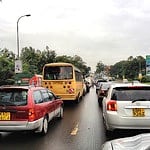Kenya's tech community collaborates to put an end to Nairobi's traffic

Skift Take
You can crowdsource all the data you want, but it will take an engaged and compliant population to buy in to the system to produce any kind of change.
Like all Nairobians, Jessica Colaço hates traffic jams, especially the out-of-nowhere monster tailbacks that make travelling in this sprawling city a gut-clenching gamble. Unlike most drivers, Colaço is doing something about it.
The 30-year-old is a research manager at Nairobi's iHub, a tech innovation centre where Kenyans brainstorm ideas. She is helping her team develop intelligent traffic lights to ease the chaos in the city considered to have the fourth worst commute in the world.
"I hate driving in Nairobi. There is no management on the junctions … It becomes a deadlock," she said. City officials estimate traffic jams cost east Africa's largest economy more than 50m Kenyan shillings (£365,000) a day. "It's about measuring the traffic density and congestion … and instead of pre-programming the traffic lights, you make them intelligent," she added. "The idea is to have them spread across the highway so they are talking to each other."
What Colaço is suggesting is not revolutionary: other cities around the world use smart traffic lights. But if her team is successful, and if drivers buy in, it could spur a mini-uprising in a city where most traffic lights are ignored by drivers, and overruled by poorly trained police.
The project grew out of one of the regular robotics boot camps run by the iHub, set up in 2010 by the founders of Ushahidi, a non-profit, open source platform for crowdsourcing information during disasters. The iHub, where wannabe developers huddle together at small tables in an airy fourth-floor room, is part of Kenya's booming tech industry.
Colaço says the project is a "bare bones" assignment – and when a research assistant, Juliette Wanyiri, 22, brings out the prototype, it looks more like a child's game than the answer to the paralysis already spreading along Ngong Road four floors below.
The model has three coloured pins representing the traffic lights, linked by pink, green and yellow wires to a motion sensor, a camera and a mini-computer. "It's a simulation model, whereby we have a microcontroller with the traffic lights and we have the sensors that sense the congestion," Colaço said. The system is due to be tested on Ngong Road soon. "If the traffic reads higher than our benchmark then the red light should go off and the green light should go on," Wanyiri said.
Along Ngong Road, one of Nairobi's busiest arteries, people wondered whether drivers could be persuaded to obey traffic lights, even smart ones, in a city where the rules of the road seem to be open to personal interpretation.
"Even if you bring in new [lights], if someone is used to breaking the law, he will continue with that habit," said Joseph, a financial services worker.
Overtaking on the wrong side of the road, driving the wrong way, or dodging boulders placed to stop vehicles from using unfinished bypasses are common in Nairobi. A few drops of rain can bring the city to a standstill. At night, traffic lights are ignored, not least because in this rich-meets-poor city, stopping is seen as an invitation to be mugged.
Colaço believes people will change their driving habits if they see the system works.
The undisputed kings of highway anarchy are the drivers of matatus, Nairobi's public minibuses, who are widely condemned for speeding, failing to indicate and stopping in the middle of junctions.
Dante, who collects money and shouts out destinations, doubts smart traffic lights would hold much sway with matatu drivers, and had his own ideas about what should be done. "At each and every junction, they should have a cop because then the jams will be easier," he said.
The iHub project is just part of a broader effort to get Nairobi moving. New bypasses and an eight-lane superhighway have been built and in August, the World Bank said it would invest more than $300m to develop a mass rapid transport system.
The iHub researchers can only dream of such funding. Laughing, Colaço and Wanyiri show off their financial war chest: a glass jar with a couple of shillings rattling in the bottom.
![]()


